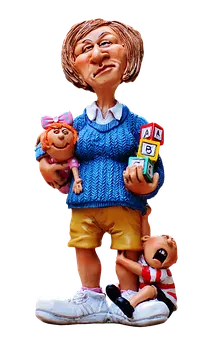But wait, is that always the case? Is it true that this child can not follow the lesson ... Or is he actually having trouble concentration and nothing can be done with their intellectual ability? This paper tries to introduce more about concentration disorders and what we can do to help children with symptoms as already mentioned.
Children with impaired concentrations generally appear to be very easily distracted, impulsive, always nervous or overactive and have difficulty surviving a task. Some children tend to look daydreaming and find it difficult to follow instructions or have difficulty controlling themselves. There are several types of children with attention disorders:
1. Not attention
Inattentive children often lose attention, are easily distracted, often seem to daydream, or lose concentration quickly. Their short-term memory is affected, often forgetting what they hear, especially dealing with multi-task or multi-message, ie more information or tasks than one although their long-term memory is usually very good.
However, when the activities they do are interesting or new to them, they can concentrate well and are very excited, for example when watching television or playing computer. There are also inattentive children who seem silent and well behaved, but often can not accept the material and lose the important things in the learning process so that without realizing they will also have learning difficulties.
2. Impulsivity
An impulsive child never thinks about the consequences of his actions. They tend to beat, run, injure, lose control or damage things, enjoy doing something forbidden. Impulsive attitudes are quite normal for 2-year-olds but generally, after 4 years of age, they will begin to be able to control their behavior. However, an impulsive child cannot develop this control so that he or she becomes a child who has too much talk or too many actions that are less acceptable to the social environment.
Impulsive children generally need and expect momentary satisfaction, "I want it and I want to get it now." They have trouble waiting their turn or waiting for others to do what they ask.
3. Hyperactivity
Hyperactive children seem always busy, always active, always running, or always moving. They often have trouble sleeping, never run out of energy, it is difficult to sit still, always move, restless or jump. Some children always seem to want to touch things they see and will be happy to be outdoors where they can run.
All children are generally very active and enthusiastic, but there are times when they rest and relax at a certain time. A truly hyperactive child is very difficult to relax and can only concentrate in a very short period of time, usually while doing things like watching television, playing computer or in certain situations.
4. Distractibility
A distractible child is very difficult to survive a particular task, very easily distracted even by a quiet voice, someone passing by, or something he finds interesting.
Even when he is doing something he likes, for example when he is reading or playing something, this child will move attention when there are things that bother him and difficult to concentrate again. Children who are a distractible experience many difficulties with the number of stimuli in the vicinity. They need hard work to filter out every sound or light. They can work and play well if there are few people and the situation is calm.
5. Disorganization
Children find it difficult to control themselves, forget easily, often lose their belongings, and often confused. Children who have difficulty in self-control seem confused to dress themselves or scattered when eating.
6. Social difficulties
Children experience difficulties in social interaction, it is difficult to have a great time to feel comfortable with friends. Their impulsive and disorganized conditions make them unwilling to follow rules and do not follow the social norms that govern their interactions with others.
7. Difficulties with coordination, learning problem
Children who have difficulty with attention usually also experience interference in other aspects, including gross motor skills or smooth, or having difficulty in learning, such as difficulty reading, writing or counting.
All of the above! Does he have a concentration problem? Relax, do not panic first, basically the above behavior experienced by almost all children because it is part of the growth process.
But if it interferes with daily activities, or learning activities and social interactions, and quite consistently/ permanently appear for about 6 months in a row, it's good we give extra attention.
If it is necessary to consult with a psychologist or pediatrician to be sure. If only occasionally arise and sometimes not, it helps us learn how to help them, because the concentration can be trained and taught.
Indeed, concentration disorders are rarely diagnosed for children under 5 years old, because they can still be considered as part of growing up so that parents often think, "Ah, he is small, 3 or 4 years old, most likely to be alone."
This assumption is not wrong, because there is a child who while growing, his concentration and self-control is also more stable. But the reality is more that is not so because environmental factors also unwittingly trigger children to experience concentration, such as too much video game or watching TV is suspected as a trigger factor.
This tends to be more dangerous because it rarely gets the attention and the right treatment is ultimately unhandled and when elementary school ultimately disrupts the learning process.
Here are some "Do and Do not" that can help train children to focus attention.
Do (what to do):
• Get their attention first. Use eye contact and touch to get their attention. Keep the eye position aligned (it's good when talking to children with the disorder we bend the legs /resting on the knee to get eye contact).
• Give a simple and clear example - one 'task/ message/instruction' at a time, make sure he understands what we are saying.
• Demonstrate the requested behavior. Practice what you instruct, be calm and do not rush to the child can follow it.
• Conducting routine and structured activities. Children with difficulty in concentration are quite sensitive to the routine. Explain if there is a change to the child is not surprised.
• Accompanying the child during the transition, for example in a new social situation (eg at the start of school), because he can not predict what will be faced, and this can lead to disruption of concentration.
• Make clear rules. Make the rules simple, clear and fair enough to be accepted by the child. We also have to be consistent, because the child will be confused when for example this time allowed, then tomorrow should not be. Or may not be by mama but her father supports.
• Give awards when children do the expected deeds. Not with excessive praise or flooding it with gifts, but it is important to reward and acknowledge that he succeeds improve his behavior.
• Reduce the things that make things worse. For example, temporarily exclude or draw valuables out of the reach of a child if it worries us (such as a display of crystal or urn that attracts the child to "touch" it)
• More guidance than coercion. Navigate to a positive behavior because the more prohibited the child will be more rebellious.
• Provide opportunities for instruction, for example by being warning up to three times to allow them to correct their behavior.
• Star charts, especially to reward children when they manage to correct their difficult behavior.
• Help with social skills, help children learn how to interact with others, share, play together. Try to discuss "social issues," such as asking how she reacts when her friends hit each other or fight for a toy so she learns to deal with more positive social situations.
• Build confidence. Try to focus on the positive and the advantages of the child so that he is more positive to see himself and not always blamed. A loving, supportive, and consistent environment is very helpful for children to grow confidence.
Do not (to avoid):
• Shout - because in addition to draining our energy, the child will be difficult to receive the core message that we convey even cause rejection of the child.
• Beating - this actually makes children more resistant.
• Say "do not" over and over - try to be more direct the child's behavior, even if you have to say "do not" or should not try to give us an explanation of "why" even if not then the child should be given feedback.
• Focus on difficult /problematic behavior - we will be panicked at how much behavior needs to be fixed, try to focus on one thing so that the child does not feel, "Why?... I'm wrong anytime."
• Confrontation - using the power to direct child behavior other than exhausting can make you desperate for rejection. Involve the child to work together to improve his behavior.


